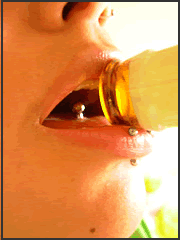
© iStock
The team’s study was based on a survey of nearly 9000 Norwegian teenagers aged 13-19 years and was published in the online journal Child and Adolescent Psychiatry and Mental Health. Fully 80 per cent of the teenagers said they had tried alcohol, while 29 per cent said they had been drunk more than 10 times in their lives.
Boys who drank frequently were more likely to report conduct problems, while girls who drank frequently reported attention and conduct problems, along with depression and anxiety.
Forty-three per cent of students who reported behavioural or other problems also reported having been drunk more than 10 times in their lives, while only 27 per cent of students who reported few or no conduct problems had been drunk more than 10 times. But boys were only slightly more likely than girls to report drinking heavily.
Team leader Arve Strandheim, from NTNU’s Department of Public Health and General Practice, said the findings could help parents and health workers focus their alcohol education efforts on teens at most risk for developing problems.
“It is important to give all teenagers and parents correct information to delay the age at which teens start drinking alcohol and binge drinking,” Strandheim said. “However, it may be particularly important to focus on teens with attention and conduct problems and girls with anxiety and depression.”
The data were drawn from a comprehensive, population based cross-sectional survey called Young HUNT. Ninety-one per cent of the youth population in one Norwegian county answered the drinking and behavioural questionnaire as a part of a larger comprehensive health survey of the entire county’s population aged 13 and older.
Because the study was based on a one-time questionnaire, it does not show a cause-and-effect relationship, Strandheim cautioned. In fact, because conduct and attention problems tend to emerge early in childhood, it seems less likely that adolescent alcohol use itself causes these mental health problems. But the study does suggest that adolescents with attention and conduct problems are at high risk for developing alcohol problems.
Teenaged girls with depression or anxiety symptoms should also be considered at high risk of developing alcohol abuse, the researchers say. This is especially true for younger teen girls aged 13-16.
Source: Norwegian University of Science and Technology (NTNU)
